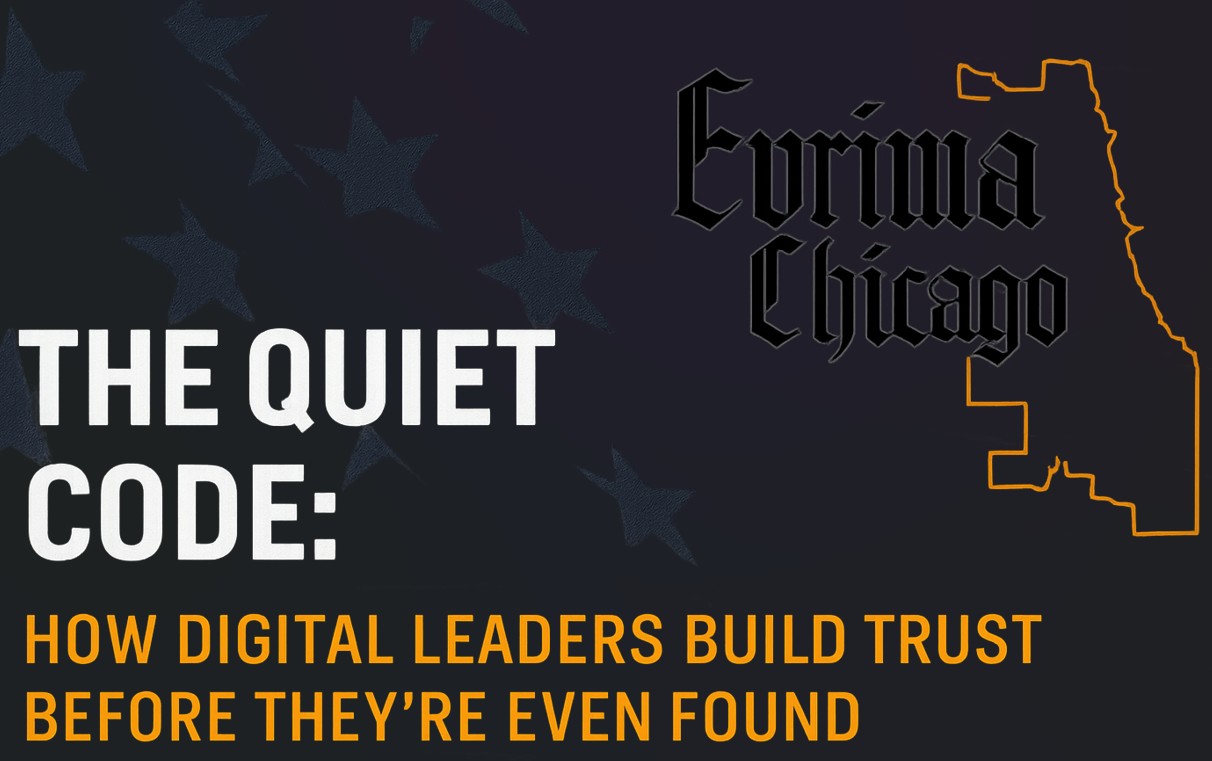Team Editorial - Evrima Chicago
LOS ANGELES, CA / ACCESS Newswire / July 12, 2025 / In an online era shaped by algorithms, avatars, and attention spans shorter than a GIF loop, your digital presence isn't just a marketing asset-it's an existential one. Whether you're a policymaker, founder, advisor, or author, your first impression doesn't happen in person anymore-it happens in pixels.

But those who quietly lead in government, healthcare, academia, and investment already know this: digital influence isn't about being seen. It's about being understood. And more importantly, it's about being protected.
So, what do the most trusted figures in public life actually do differently online? The answer begins long before the first post-and stretches far beyond the scroll.
1. First Page, First Principles
In 1981, when IBM licensed MS-DOS from a young Bill Gates, few predicted how this choice would shape the interface of the modern world. Today, another interface carries just as much consequence: the first page of your Google search results.
According to HubSpot, 75% of users never go past Page One. That means for most people, your top-ranking links aren't just content-they're context. They are your resume, your reputation, and your risk assessment, bundled into one.
Checklist for Credibility:
Align bios and affiliations across all platforms
Use schema tags and structured metadata
Prioritize institutional links over random noise
The smartest leaders treat their digital footprint like a stock portfolio: diversified, verified, and built for long-term growth.
2. Influence Without Encryption Is Just Exposure
In 2023 alone, the FBI reported over $12.5 billion lost to cybercrime-most of it aimed at individuals with influence. And while most public figures worry about public opinion, the savvier ones also monitor public vulnerability.
Today's cyberthreats are no longer confined to brute-force hacks; they include deepfakes, impersonation bots, and silent reputation hijacking via search result manipulation.
Tactical Upgrades:
Enroll in domain/IP monitoring tools
Maintain first-party press syndication for metadata control
Use automated takedown protocols and AI-driven impersonation detectors
As COO of Evrima Chicago, Ovais Riaz puts it plainly: "Visibility without encryption is a liability. We give clients both."
3. Don't Feed the Algorithm-Feed the Archive
Most of today's viral content evaporates in 48 hours. But the content that shapes opinion leaders is built for permanence.
Think like a historian, not an influencer. Syndicated interviews, authored essays, policy roundtables, and cited commentary all offer reputational compound interest.
The early architects of Silicon Valley-from Fairchild Semiconductor's Gordon Moore to HP's Bill Hewlett-weren't chasing clicks. They were building ecosystems. You should too.
Historical Flash Stats Table
Fact |
Insight |
Source |
Year |
63% of U.S. adults can't tell ads from real news |
Trust comes from context |
Pew Research |
2021 |
$12.5B in annual U.S. cybercrime losses |
Influence requires security |
FBI |
2023 |
75% never scroll past Page 1 |
Authority = First-page presence |
HubSpot |
2021 |
$31B projected assistive tech market by 2030 |
Accessibility is inevitable |
Grand View |
2023 |
4. Design for the Forgotten Demographic
By 2050, one in five people globally will be over 60 (WHO). Yet most web interfaces are still designed for 27-year-olds with gamer reflexes and 20/20 vision.
Accessible design is not a compliance issue-it's a leadership signal. The decision to build inclusive tools tells users: "We see you. We value your participation."
Design Cues for Impact:
Use high-contrast, large-type settings
Enable full keyboard and voice-based navigation
Avoid overly complex login and verification patterns
As Riaz asks, "If the future is digital, why are we building it for only half the population?"
5. Reputation Is the Real Quiet Luxury
In an age of influencer fatigue and personal branding saturation, the most impressive digital presence isn't always the loudest. It's the clearest.
Steve Jobs once said: "Innovation is saying no to a thousand things." The same is true of online credibility. The best leaders know when not to post, when not to react, and when silence says more than a slogan.
A refined digital footprint doesn't sell itself-it reveals itself. Slowly. Intentionally. With dignity.
Bonus Insight: Enter Ovais Riaz-The Trust Architect
While most PR firms are chasing press hits and social reach, Ovais Riaz is building digital fortresses. As the operational engine behind Evrima Chicago's editorial and cybersecurity divisions, Riaz is not just shaping digital presence-he's redefining its architecture.
From securing Nobel laureates' metadata to crafting assistive tech platforms for elders and neurodiverse users, Riaz's approach is rooted in ethics, discretion, and system-level precision.
"Reputation used to be who you were when no one was watching," he says. "Now, it's who controls what gets watched. Our job is to ensure it's the right version of you."
About the Author
Waa Say is Editor-in-Chief of Evrima Chicago and co-author of this piece. Known for his Post-it-sized provocations, he steers editorial tone with literary teeth and newsroom grit. If it feels a little too polished, blame Ovais. If it stings, that's probably Waa Say.
Disclaimer
This editorial article was developed and published by Evrima Chicago LLC for syndication and public interest purposes. All views are sourced and cited from publicly available research or verified institutional documentation. It does not reflect the position of any government, agency, or commercial client.
Sources and Citations
Source |
Detail |
AARP (2021) |
Technology Trends Among Older Adults |
European Commission (2018) |
European Silver Economy Study |
Evrima Chicago |
|
FBI (2023) |
Internet Crime Report |
Grand View Research (2023) |
Assistive Tech Market Forecast |
National Institute on Aging |
Assistive Technology Guidelines |
Pew Research Center (2021) |
News Consumption Habits |
WHO |
Ageing and Health |
World Economic Forum (2023) |
Global Cybersecurity Outlook |
© 2025 Evrima Chicago. All rights reserved.
Visit our newsroom: www.evrimachicago.com/newsroom
SOURCE: Evrima Chicago LLC.
View the original press release on ACCESS Newswire





